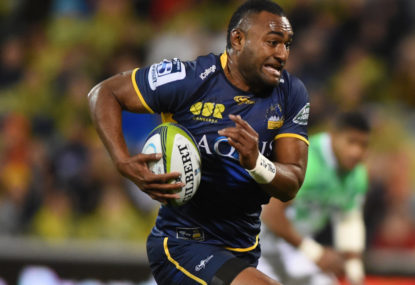First, the good news from a generally dismal Round 14 of Super Rugby 2017 for the Australian teams.
The real Brumbies are back, at least during their convincing 39–15, six tries to two thrashing of the Jaguares at Velez Sarsfield Stadium.
The Brumbies used their driving maul only occasionally, more as a softening up weapon for some rapier-like ensemble attacks. The maul was a supplement to a relentless attacking game played by a classy Brumbies side, rather than the main form of attack as it has been for some years now.
This was a terrific game of rugby. The Brumbies, particularly, passed, ran and recycled at pace, in contrast to their usual Jakeball plodding game. Play went on for phase after phase as both teams attacked each with the ball in hand.
And we were given the blessed sight of high skills from players like Joe Powell (surely the future long-term Wallabies halfback) and Tom Banks, a winger/fullback with the priceless talent of pace, probably the most exciting young Australian player to emerge this season.
With the shackles of the rolling maul as the main attacking ploy dropped, the Brumbies went back to the clever passing and running game, backed up by stiff defence, that was the hallmark of the side during its glory days.
And wonder of wonder, a side that has found it difficult to maintain flow in its attack and score points notched up six tries.
And not before time for the Brumbies. Before the rout against the Jaguares, the Brumbies had scored only 219 points in their 11 matches. Only the Rebels among the Australian teams had scored fewer points.
The truth of the matter and the main argument against Jakeball as an effective winning strategy is that teams don’t score tries if the opposition has the ball.
One of the unintended consequences of the new rules regarding head contact is that it has penalised the Bryan Habana-type tactic of charging into the catcher and taking him out while he is attempting to make the catch.
This charging of the catcher now often ends up with a yellow card or a penalty against the charging player. In Bryan Habana’s day, he often won the penalty by stopping the catcher from releasing the ball.
The balance of advantage, therefore, has been turned against the high ball tactic.
This obvious fact seems to be lost on so many Super Rugby coaches and, flowing on from this, to the players they are coaching.
I don’t understand, for instance, why so many halfbacks, many of them playing for Australian franchises but also the Highlanders’ Aaron Smith, persist with the play of virtually handing the ball back to the opposition by kicking to them.
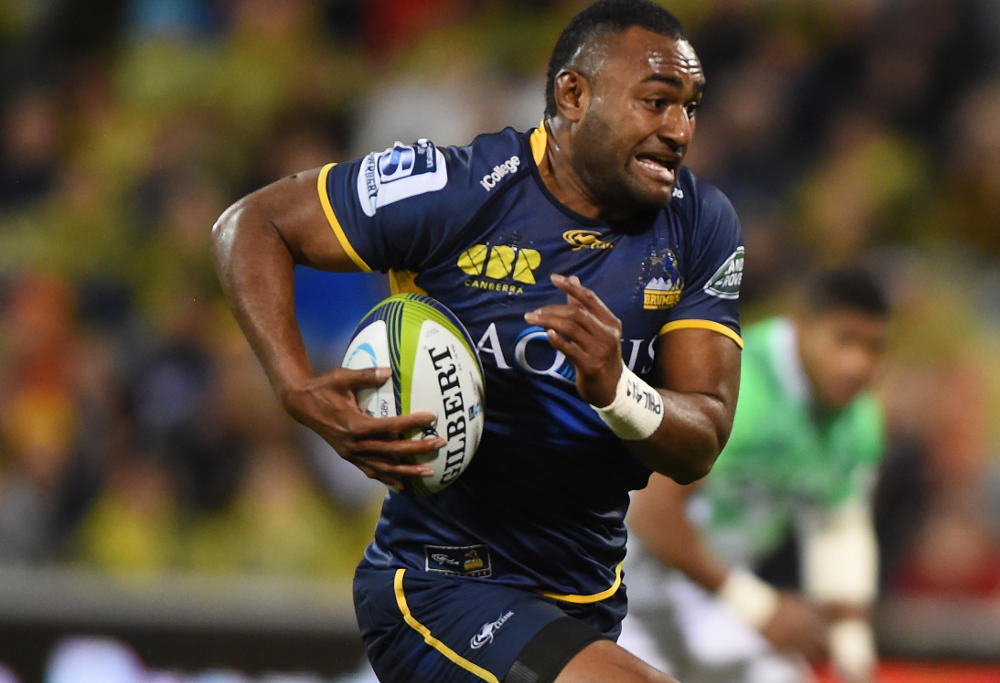
(AAP Image/Dean Lewins)
Even more importantly, I don’t understand why coaches tolerate their halfbacks kicking away the ball, often after turnovers that hard-grafting forwards have won back for the side.
Australian coaches especially, because their players are the worst offenders, need to apply the old Randwick Club rule laid down in their glory days as the Galloping Greens: if you don’t re-gather a kick through, you get hooked from the field.
Even the Brumbies made this error of box and chip kicks from time to time against the Jaguares. But, essentially, they were true to the traditional Brumbies game as the half-time statistics reveal: 63 per cent possession, 381 metres gained, and just one handling error.
I mention the half-time statistics because in the first 40 minutes, even when the scoreboard doesn’t always show this, the result of the match is often settled.
The All Blacks win about 97 per cent of their Tests when they are leading at half-time.
Bob Dwyer, moreover, is always vehemently critical against sides that start to run the ball towards the end of the match when it may be effectively lost. The time to run the ball is at the beginning of the game, when the outcome of the match is usually decided.
And a great All Black running five-eighth and later selector, Earle Kirton, always insisted that the ball should run right from the beginning of the game (as the All Blacks showed against the Wallabies in the final of Rugby World Cup 2015) because “this might be the best ball you get all match.”
Coming back to the Brumbies and Stephen Larkham, I have been critical of his coaching this season and last season, in fact. But all is forgiven, for the time being, perhaps.
The Brumbies moved the ball around with intent and skill. They injected pace and urgency into their play. The Jaguares had no answer to their skilful, aggressive play.
If only some of this could have been said about the other Australian sides.
To be fair, the Western Force had some coherency and method in their play against the hapless Reds. But they were playing the Reds, after all.
So, in the case of the Force, the coherency and method are only relative. Even with their comprehensive victory over the Reds, the Force this season have scored 230 points to the Reds’ 259, conceded 337 to 390 and have 17 competition points to 16.
Neither team, Force or Reds, are up to Super Rugby standard.
It is likely, though, that the Force will be the Australian team dropped from the Super Rugby for reasons involving the costs of maintaining a side so isolated in Australia from the eastern seaboard.
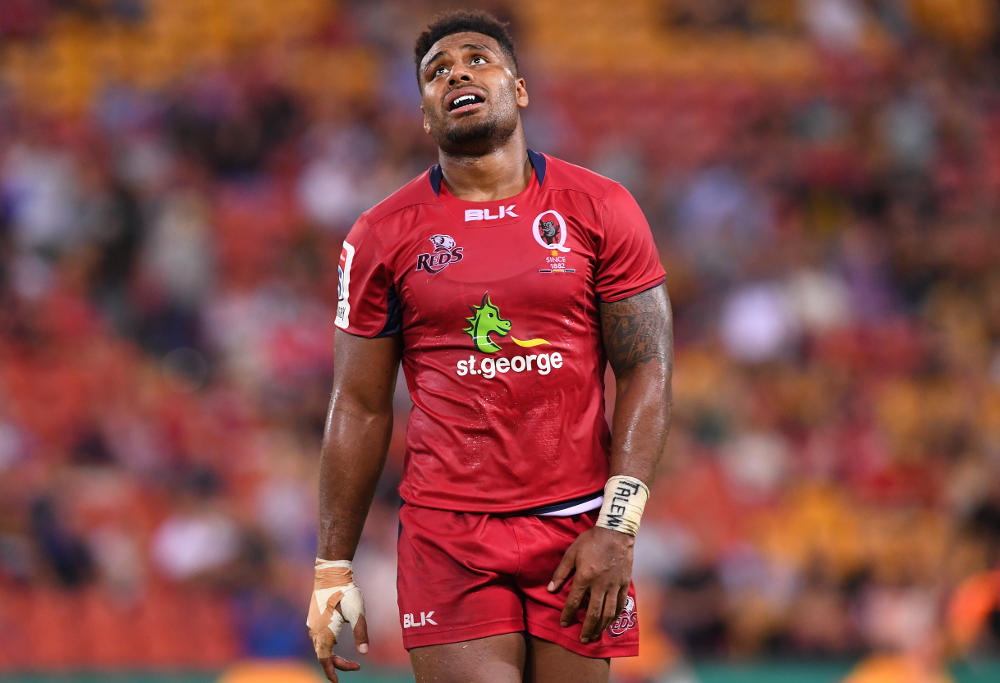
(AAP Image/Dave Hunt)
But the fact of the matter is that on merit, the Reds should really be considered for being dropped. This won’t happen because, in theory, Queensland is one of the powerhouses (along with NSW) of Australian rugby.
This fall from grace by the Reds is directly related to the appointment of Richard Graham as the head coach several years ago.
This appointment should have been investigated by the ARU’s High Performance Unit to provide an understanding of how the system of appointing Super Rugby coaches can be improved.
Let me be blunt here. Too many appointments at the higher levels of Australian rugby, involving coaches and officials, see mates getting jobs they are plainly not capable of doing.
Until the people who run the game allow a lot more openness regarding decisions that are made over coaches and over appointments to the board and ARU officials, the game is going to become weaker and less popular than it has been in the past.
Going back to the matches, the Waratahs led the Highlanders 14–13 at Barr Forsyth Stadium at half-time. They got the faster start they have been looking to make all season. But the team folded in the second half which ended with the scoreline of 44–28 to the home side.
The turning point in the match came just after half-time when Dean Mumm was sin-binned for a stupid dumping of Elliot Dixon following a lineout.
Mumm lifted Dixon’s legs above his head and allowed him to fall to the ground. Dixon landed on his stomach. But the action clearly came within the reckless definition and a yellow card was warranted.
The Highlanders scored two tries while Mumm was off the field.
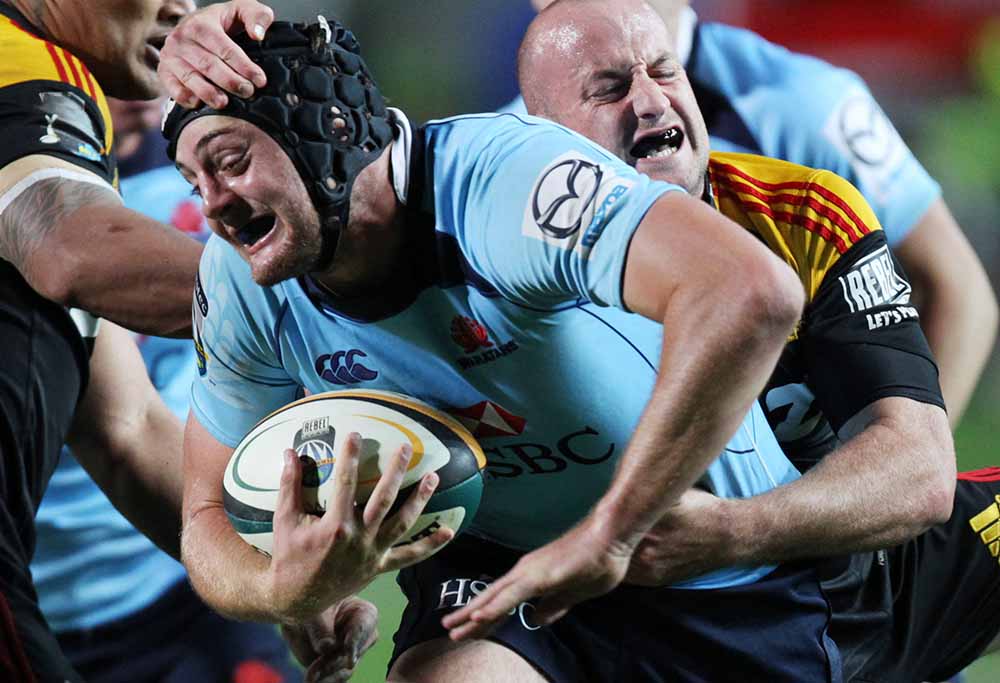
(AAP Image/NZPA, David Rowland)
Here I might make a comment about Justin Marshall’s growing tendency to somehow criticise any refereeing decision that goes against a non-New Zealand team.
He seems not to understand the laws of rugby and frequently ends his erroneous (in my opinion) views with the comment, “what do I know about it?” Well, the answer is: “Not very much.”
Commentators who criticise the referees without actually knowing the laws misinform viewers, particularly supporters of struggling teams like the Waratahs in the case of the Mumm yellow card.
The fact of the matter is that Mumm (who is a terrific person off the field) has been a serial offender throughout the season when it comes to reckless and dangerous play.
Commentators like Justin Marshall are doing him and the Waratahs no favours by somehow excusing inexcusable plays.
At least Michael Hooper is on the ball concerning this matter. After the match he was adamant: “Ill discipline killed us.” That should really have been the response of Justin Marshall.
Only the Rebels (474) among the Australian sides, have given away more points than the Waratahs (396).
The worry here is that Nathan Grey is the Wallabies’ defence coach, as well as the Waratahs’ defence coach.
In the other Australian–New Zealand match-up, the Rebels-Crusaders match at AAMI Park in Melbourne, the visitors established a dominant lead at half-time and, although the Rebels “won” the second half, the final score was a decisive 41–19 thrashing against them.
So the bad news from the Round 14 was that the New Zealand dominance over Australian teams in the 2017 Super Rugby season has been entrenched with two more New Zealand victories.
Only the Brumbies, of the Australian teams, played like a side that is of Super Rugby standard. This criticism applies even to the Waratahs, despite their strong first half play against the Highlanders.
This is becoming an annus horribilis for the Australian Super Rugby teams.
They have won, in total, 17 matches. The New Zealand teams have won 48 matches. The bottom New Zealand team, the Blues, have won more matches (six) than the top Australian team, the Brumbies (five).
And remarkably, no Australian team has beaten a New Zealand team, either at home or away, this season.
The victory of the Brumbies against the Jaguares, an away win to go with the away win in South Africa against the Kings, stands out amidst the dross offered by the Australian sides. So we have to be thankful for small mercies.
There is clearly a coaching and playing crisis in the Australian Super Rugby conference.
The two are linked. Good coaching develops and creates good players. And the opposite also applies.
Look at the improvement and depth in the Crusaders following Scott Robertson’s appointment of coach this season to replace Todd Blackadder.
I have never rated Blackadder as a coach. The Crusaders, under his coaching, remained a formidable side but could not win crucial finals matches during his tenure. The play of the side was too predictable with east-west passing movements that looked good but were essentially ineffective and easily defended in the big matches.
Robertson has introduced a more direct north-south game while retaining the Crusaders’ traditional wide game.
This is the sort of effective and practical coaching that the Australian sides desperately need.
Along with this, Robertson has introduced new players and put some of the emerging players in different positions where they have flourished. Look at the improvement in the play of David Havili at fullback for the Crusaders, after a couple of seasons as a centre/wing.
Compare, too, the development in Havili’s play with the lack of development in the play of Israel Folau while he has been at the Waratahs.
Folau scored a terrific try for the Waratahs in the first half of their match against the Highlanders. But was he even on the field in the second half? He seems to disappear in the game in long periods of play.
Again, we come back to coaching.
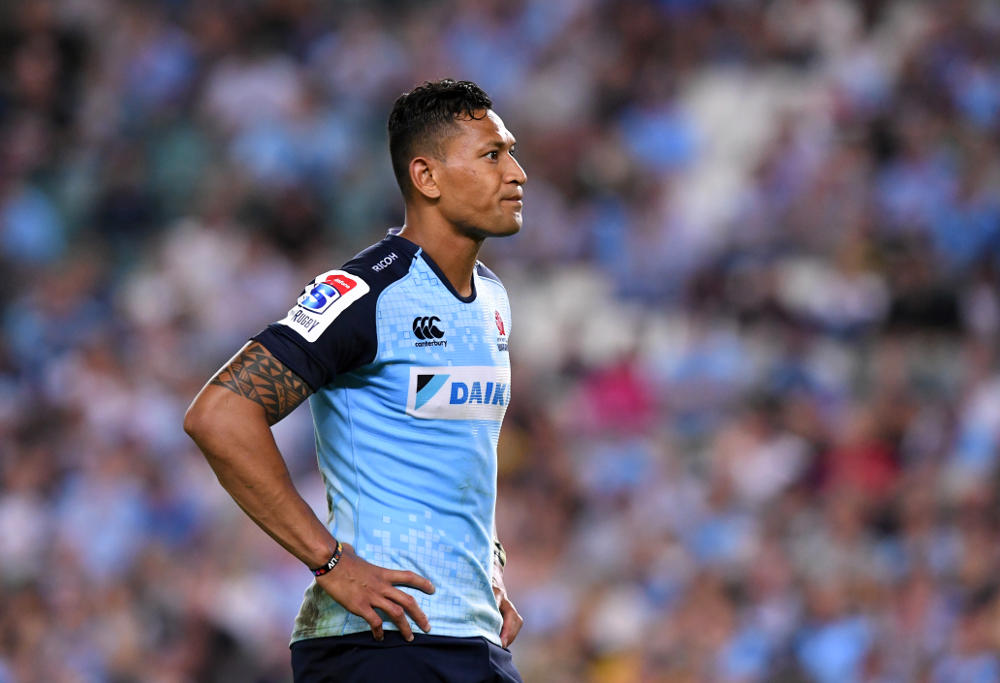
(AAP Image/Paul Miller)
Developing the potential of their players, improving all the players, providing game plans that suit the skills and physical attributes of the players and providing an environment where all the players, especially the senior players (take note Dean Mumm) act as the leaders, on and off the field, all these aspects are part of the job description for a successful rugby coach.
Right now, we have to say there is not one Australian Super Rugby coach (and this includes Stephen Larkham, despite the two splendid away victories) who can claim success in these areas this season.
This brings us the ARU’s initiative (and about time) to establish a National Coaching Panel “to oversee coach development and education across the country.”
According to the ARU media release, the panel is the result of discussion between Michael Cheika, Bob Dwyer, Dick Marks (a former Wallaby who created a successful ARU coaching program in the 1980s), Rod Kafer, Mick Byrne and Ben Whitaker (the ARU’s general manager of High Performance).
The National Coaching Panel will oversee and support “a national development strategy and program,” develop the “national fundamentals of what and how to coach” and support “the on-going development of coaches at the professional and emerging levels, including Super Rugby and the Wallabies.”
The idea, according to Michael Cheika, is “to get all coaches throughout Australia on the same page … where ideas can be shared with the ultimate goal of improving the performance of the Wallabies.”
This sounds like a good idea that deserves qualified support.
Why ‘qualified support’?
Because in the ARU statement, Ben Whitaker is quoted as saying this about the discussions to create a National Coaching Panel: “Importantly, it wasn’t a meeting looking at failures within the current coaching development system – it was about identifying opportunities to enhance the system …”
Sorry Ben. The ARU’s High Performance Unit’s performance deserves to be scrutinised as part of the coaching system in Australia because it may be part of the coaching problem in Australia.
Another concern relates to the ARU’s tendency to exclude from its deliberations many experts across the field of Australian rugby.
Ben Whitaker ended his long comment on the National Coaching Panel with a reference to the ARU continuing “to draw on experienced exceptional rugby minds in Australia … to ensure we are delivering the best possible program.”
And the last sentence: “Having the likes of Bob Dwyer and Dick Marks working alongside us throughout this process is invaluable.”
If I could make a couple of suggestions about all of this.
Why hasn’t Rod Macqueen, Australia’s most successful Test coach, been brought into this initiative from the start?
And Mark Ella? He wrote an incisive column in the Australian on Saturday, “Follow Templeton’s lead and put the next generation into the selection mix for Tests,” that should be compulsory reading for Michael Cheika leading up to the announcement on Tuesday of the Wallabies Test squad.
I would also recommend Ric Charlesworth, arguably Australia’s greatest coach, be brought into the process, too.
Let’s hope that the National Coaching Panel is an open-access initiative and not another one of the ARU’s jobs for the favoured boys arrangement.





























































































